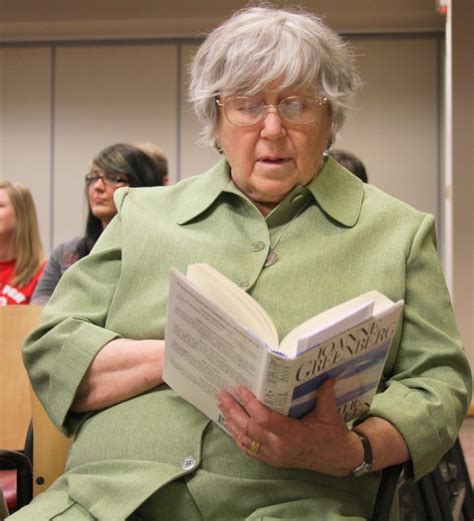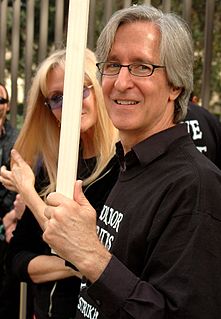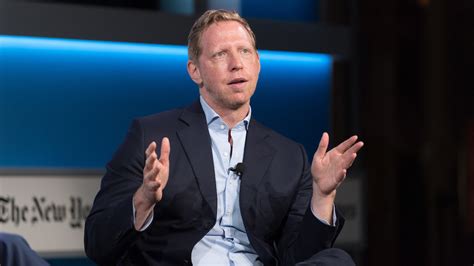A Quote by Frank Abagnale
I was very blessed it was Steven Spielberg who made the movie. He was very much into the redemption side of the story. They asked him in an interview why he had owned the rights to this story for 20 years before he made the movie, and he said, 'I wanted to see what the real Frank Abagnale did with his life before I immortalised him on film.'
Related Quotes
I really wanted to work with Luc Besson. I'm a big fan of his. Did you ever see 'The Professional.' It was very violent. But a fabulous story, a fabulous movie, very well done. So that and two or three other projects of his that I've seen, I just thought if I had a shot to work with him I wanted to do it.
That story about the two women in my life is - a lot of people get upset, a lot of people question it. Steven Soderbergh said to me, "The story of your life is incredible. The real story of your life that's interesting, more interesting than all the other stuff - the franchises, the movies, the songs, Elvis Presley, Frank Sinatra - the real thing that's interesting and unbelievable is the relationship with these two women. And if you're willing to put that out there, you know then, you're going to have a great movie. Because that's the movie."
I had no intention of replacing Arnold [Schwarzenegger]. There were a few things that made me want to do the movie. They were the script which had a different direction to it, and it was a chance to do a very different Quaid. I didn't read the short story until I went to college.Reading the story had a different effect on me of how I pictured him to be and the tone of the story was different. In the story, he's a bit more of an everyman.
I once had a patient who used to practice the most horrible tortures on himself, and when I asked him why he did such things, he said, 'Why before the world does them.' I asked him then, 'Why not wait and see what the world will do?' and he said, 'Don't you see? It always come at last, but this way at least I am master of my own destruction.
There was a tale he had read once, long ago, as a small boy: the story of a traveler who had slipped down a cliff, with man-eating tigers above him and a lethal fall below him, who managed to stop his fall halfway down the side of the cliff, holding on for dear life. There was a clump of strawberries beside him, and certain death above him and below. What should he do? went the question. And the reply was, Eat the strawberries. The story had never made sense to him as a boy. It did now.
Alejandro Amenábar is a very interesting filmmaker. I had really liked The Others, which was a movie he made with Nicole Kidman a few years ago. He made a very compelling case about how much he wanted me to be in this movie. Whenever a really passionate, talented filmmaker seems to have an interest in me, I take it very seriously because I like to work.
I didn't get a chance to meet Glen [Beck] for this movie. I did meet him a few years ago, coincidentally, before any of this happened. But I've been familiar with his work, so I felt I wanted to get it right. I wanted to honor him. I respect him and I think the way he does his job is admirable. Yeah, there was an added incentive. I wouldn't call it pressure, but incentive perhaps.
Giancarlo Giammetti has a lot of nervous energy. He's a director, really. He was trying to direct the Valentino movie over my shoulder. I don't blame him - that's been his job for 50 years. But I had final cut in the movie by contract and I wouldn't have made the movie if I had not been completely independent.
By a beautiful paradox of Divine love, God makes His Cross the very means of our salvation and our life. We have slain Him; we have nailed Him there and crucified Him; but the Love in His eternal heart could not be extinguished. He willed to give us the very life we slew; to give us the very Food we destroyed; to nourish us with the very Bread we buried, and the very Blood we poured forth. He made our very crime into a happy fault; He turned a Crucifixion into a Redemption; a Consecration into a Communion; a death into Life Everlasting
We did some camera tests blacking it out, we made a prosthetic with a gap in it, but that made me look like a donkey, so I vetoed that right away. And then I just finally called my dentist and said, 'You know, I've had this implant for 20 years. What's it involve in taking it out?' And he said, 'It's actually not that big a deal. We can do that.' So we took it out and I was toothless for three months, for the run of the movie [ The Hangover] .I take my job very seriously.



































